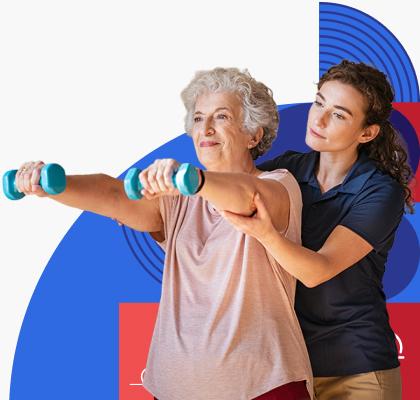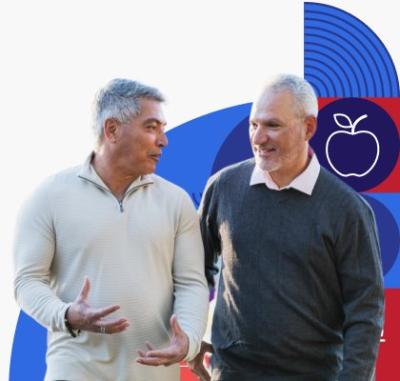Healthy Living
Protect Your Health as You Grow Older

The Basics
Overview
You can take steps to stay healthy and active as you get older. It’s important to:
- Keep your body and mind active
- Choose healthy foods
- Take steps to prevent falls
- Stay safe while driving
- Talk to your doctor about any health concerns you have
Remember, it’s never too late to make healthy changes in your life.
Take Action
Stay Active
These steps can help you live a healthier life, prevent injuries, and keep doing the things you love.
Keep your body active.
Staying active as you get older is one of the best things you can do for your health. Regular physical activity can help you:
- Lower your risk for long-term diseases, like type 2 diabetes, heart disease, stroke, arthritis, osteoporosis, and some cancers
- Improve your balance and prevent falls
- Stay independent and live on your own longer
- Improve your mood and sleep
- Help with symptoms of anxiety and depression
- Improve your ability to think, learn, and make decisions
Keep in mind that if you haven’t been active in the past, it’s not too late to start! Talk with your doctor if you have questions about what activities might work best for you.
- Get more tips on staying active as you get older
- Find out how to move your way — with activities you really enjoy
- Read about the benefits of physical activity
Do aerobic activity.
Anything that gets your heart beating faster counts as aerobic activity.
- Aim for 150 minutes of moderate-intensity aerobic activity every week — and break up the time over the week however you want. Try walking, swimming, or doing yard work.
- If you’re just getting started, go slow and do what you can. Even a 5-minute daily walk has real health benefits. Build up to more activity over time.
Get more ideas for aerobic activities you can try.
Do strength, balance, and stretching activities.
Doing different types of physical activity can make it easier to do everyday tasks. That's why it's important to:
- Do muscle-strengthening activities 2 or more days a week
- Do exercises to improve your balance and help prevent falls
- Do stretching (flexibility) exercises so you can move more easily
If you're doing physical activity outdoors, follow these safety tips. And if you have a health condition, talk with your doctor about the best activities for you. Learn more about getting active with a health condition.
Eat Healthy
Get ideas for eating healthy.
Eating healthy is always important, no matter how old you are. And it’s never too late to make healthy changes to your diet.
Choose a mix of healthy foods you enjoy from each food group, including:
- Whole fruits — like apples, berries, oranges, mango, and bananas
- Vegetables — like broccoli, sweet potatoes, beets, okra, spinach, peppers, and jicama
- Whole grains — like brown rice, millet, oatmeal, bulgur, and whole-wheat bread
- Proteins — like lean meats and chicken, eggs, seafood, beans and lentils, nuts and seeds, and tofu
- Low-fat or fat-free dairy — like milk, yogurt, cheese, lactose-free dairy, and fortified plant-based alternatives (such as soy milk or soy yogurt)
- Oils — like vegetable oil, olive oil, and oils in foods like seafood, avocado, and nuts
Use these resources to:
Talk with Your Doctor
Play an active role in your health care.
Your doctor or nurse can help you stay healthy as you get older. Take these steps before and during a visit with your doctor:
- Use the MyHealthfinder tool to get a list of preventive services recommended for you. Print out the list and take it with you to your next doctor’s appointment.
- Learn about preventive services covered by the Affordable Care Act. Most health insurance plans must cover preventive services like screenings and vaccines at no cost to you.
- Get tips for making the most of your doctor's appointments. Find out how to choose a doctor you can trust, what questions to ask during your doctor’s visits, and how you can take advantage of telehealth (virtual visits).
- Tell your doctor or pharmacist if you have questions or concerns about your medicines. Get more tips for using medicines safely.
- If you have signs of depression — like feeling down or losing interest in activities you used to enjoy — let your doctor know. Depression is treatable — and it’s nothing to be ashamed of. Learn more about depression in older adults.
If you have Medicare, be sure to schedule your Medicare wellness visit every year.
Quit Smoking
If you smoke, quit.
Quitting smoking is one of the most important things you can do for your health. Call 1-800-QUIT-NOW (1-800-784-8669) for free help with quitting. You can also:
If you have a history of heavy smoking and you smoke now or have quit within the past 15 years, ask your doctor about screening for lung cancer.
Stay Safe
Take steps to prevent falls.
Older adults are at higher risk for serious injuries from falls. Take these steps to lower your risk of falling:
- Use this checklist to make your home safer [PDF - 3 MB].
- Do exercises to improve your balance.
- Ask your doctor or pharmacist to review your medicines. Some medicines can make you dizzy or sleepy and raise your risk for a fall. Learn more about using medicines safely.
- Get your vision checked every 1 to 2 years. And be sure to get new glasses or contact lenses when your vision changes. Read more about protecting your vision.
- If you're worried that you might have hearing loss, get your hearing checked. Learn more about hearing loss.
- Learn more about lowering your risk of falls.
Put smoke alarms and carbon monoxide detectors in your home.
Older adults are more likely to be injured or killed in home fires, which is why it's important to have working smoke alarms in your home.
It’s also important to put carbon monoxide detectors in your home. Carbon monoxide is a gas that you can’t see or smell but that can kill you. Carbon monoxide is found in fumes that form when people burn fuel in vehicles, stoves, grills, fireplaces, and furnaces.
To stay safe:
- Put smoke alarms and carbon monoxide detectors on every floor of your home and near places where people sleep. Don't forget about the basement!
- Use long-life smoke alarms and carbon monoxide detectors if possible. These use lithium batteries and last longer than regular devices — and you won’t have to change the battery. Replace the entire unit at least every 10 years.
- If you use regular smoke alarms or carbon monoxide detectors, replace the batteries at least once a year. Try changing the batteries when you change your clocks back from daylight saving time in the fall.
- Test your smoke alarms and carbon monoxide detectors once a month by pushing the test button. Replace them if they don't work.
- Replace smoke alarms at least every 10 years and carbon monoxide detector at least every 5 to 7 years.
- Dust or vacuum smoke alarms and carbon monoxide detectors regularly.
You may also be able to get alarms that check for both smoke and carbon monoxide.
Consider these resources:
- Learn about home fires
- Get more information about smoke alarms [PDF - 3 MB]
- Protect yourself from carbon monoxide poisoning
Stay safe while driving.
Getting older doesn’t make you a bad driver. But changes that come with aging can make it harder for you to drive safely. You may have trouble seeing at night or find it harder to react quickly to avoid an accident.
Take steps to help keep yourself and others safe on the road:
- Get your vision and hearing checked regularly
- Always wear your seat belt
- Never use your phone while driving
- Plan your route and drive on streets you know
- If you have any concerns about your health and driving, see your doctor. Don’t risk hurting yourself or others. If you’re not comfortable driving or not able to drive, you can use this tool to check for transportation services in your area.
Take Care of Your Brain Health
Challenge your mind.
Just like physical activity is good for your body, activities that challenge your mind can help keep your brain healthy.
As you get older, you can:
- Learn new things — Take a class or challenge yourself to read a section of the newspaper that you normally skip
- Connect with other people — Try sharing meals with a friend or volunteering at a local school
- Keep moving — Joining a hiking club, trying a dance class, or taking up other active hobbies can benefit not only your physical health but also your brain
Learn more about how you can take care of your brain health as you age.
If you're forgetting things more often than usual and it’s getting in the way of doing everyday activities, talk with your doctor or nurse. Learn more about memory problems.
Caregiver Support
Get support if you're a caregiver.
A caregiver is someone who helps a family member, friend, or neighbor who is sick or has a disability.
Caregiving can be stressful — that’s why it’s important to make time to care for yourself, too. Learn how to get support if you’re a caregiver.
You can also:
Content last updated January 27, 2026
Reviewer Information
This information on healthy aging is adapted from materials from the National Institute on Aging.
Reviewed by:
Stephanie M. Morrison, MPH
Health Communications Branch Chief
Office of Communications and Public Liaison
National Institute on Aging


